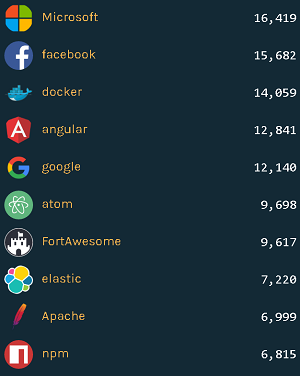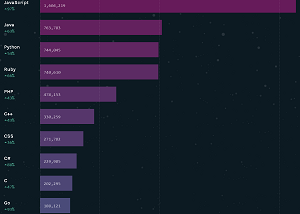News
Microsoft Beats Facebook as Open Source Champion
- By David Ramel
- September 15, 2016
Coming full circle from a proprietary pariah to community champion, Microsoft has been identified as the single organization with the most open source contributors.
The Redmond software giant edged out Facebook for that distinction in new data published by GitHub Inc. in its annual The State of the Octoverse report. Published during the company's GitHub Universe conference, the 2016 report provides stats gleaned from the vast open source code repository, such as most active projects, most popular programming languages and top contributing organizations.
Microsoft topped the latter category amid a 180-degree turnaround that has seen it open source proprietary technology ranging from the Visual Studio Code editor to the .NET Core.
With 16,419 contributors listed by GitHub, Microsoft beat out No. 2 Facebook by 737 developers. They were followed by Docker, Angular and Google rounding out the top five.
 [Click on image for larger view.]
Organizations with the Most Open Source Contributors (source: GitHub)
[Click on image for larger view.]
Organizations with the Most Open Source Contributors (source: GitHub)
GitHub also took the opportunity to highlight the growth of its robust code repository.
"Our community has grown to more than 16 million people strong, hacking on things like Free Code Camp, an open source curriculum that helps nonprofits; and Batavia, an implementation of the Python virtual machine," the company said in a blog post yesterday.
"We want to welcome the more than 5.2 million new developers who joined our community in the last year and applaud the more than 800,000 of you for creating your first pull request," the company continued. "Many of you have joined us from all over the world -- we saw explosive international growth from China, Indonesia, India, Russia, Brazil and Japan."
 [Click on image for larger view.]
10 Most Popular Languages Used on GitHub (source: GitHub)
[Click on image for larger view.]
10 Most Popular Languages Used on GitHub (source: GitHub)
Other tidbits of data found in the report, which is basically an infographic with links, include:
- JavaScript is the most popular language, with a huge lead (more than double) over No. 2 Java, followed by Python, Ruby and PHP.
- Font Awesome (a suite of 634 pictographic icons) is the repository with the most open source contributors (10,654), followed by Docker (8,253), npm (7,041) Patchwork (learning GitHub and Git) (6,806) and React Native (6,250).
- Datasharing (how to share data with a statistician) is the repository with the most forks (38,020), followed by Spoon-Knife (an example for forking a repository on GitHub) (28,738), ProgrammingAssignment2 (27,499), Bootstrap (15,669) and TensorFlow (14,070).
- Homebrew is the repository with the most users reviewing code (523), followed by Kubernetes (502), Apache Spark (478), Node.js (356) and Rails (341).
- In the last year, public GitHub repositories saw more than 5.8 million active users, more than 331,000 active organizations, more than 19.4 million active repositories and more than 10.7 million active issues.
With this data coming from GitHub, there is of course a repository for the queries used so everyone can conduct their own data-driven investigations into the GitHub Octoverse with the help of a partnership with Google BigQuery.
In fact, Google developer advocate Felipe Hoffa just last week showed off the capabilities of the company's cloud-based BigQuery data warehouse by analyzing some 1 billion files across 400,000 GitHub repositories to see if developers prefer tabs or spaces to indent their code.
GitHub also periodically publishes other data culled from its repositories, such as a report on the most popular programming languages. It also provides a venue where developers can investigate topics such as the most popular open source developer tools via its Open Source Showcases, where developers can "Browse popular repositories based on the topic that interests you most."
Also yesterday, in another blog post, GitHub announced new tools, forums and features in its GitHub Universe.
"We're announcing our biggest update to the platform yet," GitHub said. "We're making it easier for you to work together to ship high-quality code through improved code review tools, and we're giving our profiles an update to better show who you are as a developer. We're making integrating with GitHub a first class experience through major API improvements. And we're taking steps toward making GitHub a better place for businesses to get work done with added security measures for organizations."
About the Author
David Ramel is an editor and writer at Converge 360.